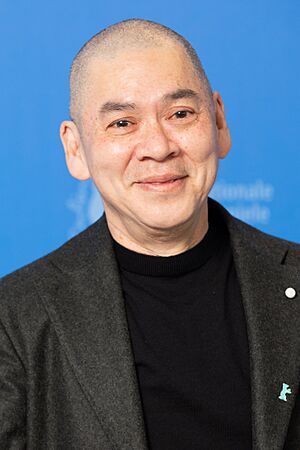Tsai Ming-liang facts for kids
Quick facts for kids
Tsai Ming-liang
|
|
|---|---|
| 蔡明亮 | |

Tsai in 2020
|
|
| Born | 27 October 1957 |
| Alma mater | Chinese Culture University (BA) |
| Occupation | Film director, screenwriter |
| Years active | 1989–present |
| Awards | Venice Film Festival – Golden Lion 1994 – Vive L'Amour Grand Jury Prize 2013 – Stray Dogs Berlin Film Festival 1994 – Vive L'Amour Best Director 1994 – Vive L'Amour 2013 – Stray Dogs |
| Chinese name | |
| Chinese | 蔡明亮 |
| Hanyu Pinyin | Cài Míngliàng |
Tsai Ming-liang (Chinese: 蔡明亮; born 27 October 1957) is a famous filmmaker from Malaysia. He now works in Taiwan. Tsai has written and directed many movies, including 11 full-length films. He has also made short films and TV movies. He is known as one of the best "Second New Wave" directors in Taiwanese cinema. His films have won many awards around the world. In 1994, Tsai won the top prize, the Golden Lion, at the 51st Venice International Film Festival for his film Vive L'Amour.
Contents
Early Life and Education
Tsai was born in Malaysia. He is of Chinese background. He lived in Kuching, Sarawak, for his first 20 years. After that, he moved to Taipei, Taiwan. This move had a big effect on him.
In 1982, Tsai finished his studies at the Drama and Cinema Department of the Chinese Culture University in Taiwan. He then worked in Hong Kong. He was a producer for plays, a writer for movies, and a director for television. From 1989 to 1991, he directed several TV films. One of these films, Boys, starred Lee Kang-sheng. Lee later became a very important actor in Tsai's movies.
Film Career
Early Films (1992–1998)
Tsai's first full-length movie was Rebels of the Neon God (1992). This film was about young people facing problems in Taipei. Lee Kang-sheng played the character Hsiao-Kang in this movie. Lee has appeared in all of Tsai's full-length films since then.
Tsai's second movie, Vive L'Amour (1994), is about three people who share an apartment without knowing each other. This film is known for being slow-paced and having very little talking. It also explores feelings of being alone. These became common features in Tsai's films. Vive L'Amour was highly praised and won awards for best picture and best director at the Golden Horse Film Festival and Awards.
His next film was The River (1997). In this movie, a family deals with the son's neck pain. The family in this film is similar to the one in Rebels of the Neon God. The same three actors played the family members. The Hole (1998) is about two neighbors living in an apartment. This film includes several musical parts.
Later Works (1999–2009)
In 2001, Tsai released What Time Is It There?. This film shows a man and a woman meeting in Taipei before the woman travels to Paris. This was the first film where Chen Shiang-chyi starred alongside Lee. She appeared in several of his next films.
Goodbye, Dragon Inn (2003) is about people inside an old movie theater that is closing down. For this film, Tsai used even longer shots and less talking than before. This style continued in his later movies. The Wayward Cloud (2005) is a follow-up to What Time Is It There?. In this film, Hsiao-Kang and Shiang-chyi meet again. Like The Hole, this movie also has several musical numbers.
Tsai's film I Don't Want to Sleep Alone (2006) was his first movie set in Malaysia. It tells the story of two different characters, both played by Lee. The film faced some challenges in Malaysia but was later shown after some changes. Tsai's next film, Face (2009), is about a director from Taiwan who goes to France to make a movie.
Recent Films (2010–Present)

Tsai's film Stray Dogs (2013) is about a family that does not have a home.
During the 2010s, Tsai focused on his "Walker" series of films. These films show a monk, played by Lee, who travels by walking very slowly. He is often seen in busy places.
In 2020, Tsai released Days. This film was shown at the Berlinale film festival. In 2021, he released Wandering, a short film with no talking. It shows a woman visiting an art show of Tsai's "Walker" series in Taiwan.
In December 2024, Tsai is scheduled to visit Australia for the first time. He will take part in an event at the Gallery of Modern Art (GOMA) in Brisbane. This event is part of a special look back at Tsai's work.
Awards and Recognition
Tsai has received many important awards for his films. These include:
- The Golden Lion for Vive L'Amour at the 51st Venice International Film Festival.
- The Silver Bear – Special Jury Prize for The River at the 47th Berlin International Film Festival.
- The FIPRESCI award for The Hole at the 1998 Cannes Film Festival.
- The Alfred Bauer Prize and Silver Bear for Outstanding Artistic Achievement for The Wayward Cloud at the 55th Berlin International Film Festival.
- The Grand Jury Prize at the 70th Venice International Film Festival for Stray Dogs.
In 1995, he was a judge at the 45th Berlin International Film Festival. In 2003, The Guardian newspaper listed Tsai as one of the top 40 directors in the world. In 2014, the government of France honored him with the Order of Arts and Letters.
Personal Life
Since 2021, Tsai has lived in the mountains near Taipei. He fixes up old apartments and lives in them. He shares his living spaces with his long-time friend and actor, Lee Kang-sheng.
Filmography
Feature Films
| Year | English Title | Original Title | Notes |
|---|---|---|---|
| 1992 | Rebels of the Neon God | 青少年哪吒 | |
| 1994 | Vive l'amour | 愛情萬歲 | Golden Lion winner |
| 1997 | The River | 河流 | |
| 1998 | The Hole | 洞 | |
| 2001 | What Time Is It There? | 你那邊幾點 | |
| 2003 | Goodbye, Dragon Inn | 不散 | |
| 2005 | The Wayward Cloud | 天邊一朵雲 | |
| 2006 | I Don't Want to Sleep Alone | 黑眼圈 | |
| 2009 | Face | 臉 | |
| 2013 | Stray Dogs | 郊遊 | |
| 2020 | Days | 日子 |
Documentaries
| Year | Title |
|---|---|
| 2008 | Sleeping on Dark Waters |
| 2015 | Nà gè xià wu [That Afternoon, aka Afternoon] |
| 2018 | Your Face |
| 2025 | Back Home |
"Walker" Series
| Year | Title |
|---|---|
| 2012 | No Form |
| 2012 | Walker |
| 2012 | Diamond Sutra |
| 2012 | Sleepwalk |
| 2013 | Walking on Water |
| 2014 | Journey to the West |
| 2015 | No No Sleep |
| 2018 | Sand |
| 2022 | Where |
| 2024 | Abiding Nowhere |
Other Exhibition Works
| Year | Title |
|---|---|
| 2001 | Fish, Underground (or A Conversation with God) |
| 2002 | The Skywalk Is Gone |
| 2008 | Madame Butterfly– part of the Lucca Film Festival project "Twenty Puccini" |
| 2015 | Xiao Kang |
| 2017 | The Deserted |
| 2019 | Light |
| 2021 | Màn bù jīng xīn [Casually] [aka Wandering] |
| 2021 | Liang ye bu neng liu / The Night |
| 2021 | The Moon and the Tree |
| 2022 | Where do you stand, Tsai Ming-Liang? |
Segments
| Year | Title | Notes |
|---|---|---|
| 2004 | Welcome to São Paulo | "Aquarium" |
| 2007 | To Each His Own Cinema | "It's a Dream" |
| 2012 | Beautiful 2012 | "Walker" |
| 2013 | Letters from the South | "Walking on Water" |
| 2015 | Beautiful 2015 | "No No Sleep" |
TV Films
| Year | Title |
|---|---|
| 1989 | Endless Love |
| 1989 | The Happy Weaver |
| 1989 | Far Away |
| 1989 | All Corners of the World |
| 1990 | Li Hsiang's Love Line |
| 1990 | My Name is Mary |
| 1990 | Ah-Hsiung's First Love |
| 1991 | Give Me a Home |
| 1991 | Boys |
| 1991 | Hsio Yueh's Dowry |
| 1995 | My New Friends |
Frequent Actors
Tsai often works with the same actors in many of his films. Here are some of them:
See also
 In Spanish: Tsai Ming-liang para niños
In Spanish: Tsai Ming-liang para niños
 | Selma Burke |
 | Pauline Powell Burns |
 | Frederick J. Brown |
 | Robert Blackburn |

